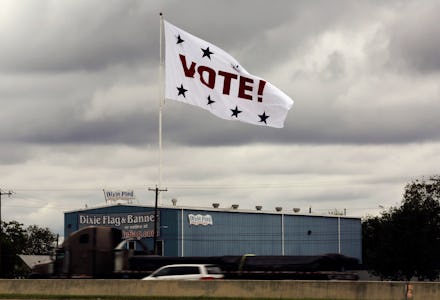Black, Latino voter suppression in the US led to lower turnouts in 2016, report says

Voter turnout in the 2016 general election was lower in states with racially targeted, suppressive voting laws such as strict photo ID requirements and advance registration cutoffs, according to a national report released Thursday.
The report, titled "America Goes to the Polls," includes a ranking of all 50 states by turnout and shows Texas and Mississippi — states notorious for adopting voter regulations that have been blocked in federal courts due to their discriminatory impact on blacks and Latinos — saw the largest drops in turnout or were ranked near the bottom.
"We know that the Obama voters didn't all turn out and that's understandable — but I think that kind of drop [in turnout] is really due to the change in the law, the confusion around registration and the fact that a lot of voters don't have the required ID," George Pillsbury, senior consultant for Nonprofit VOTE and a primary author of the report, said in a phone interview.
Voting rights advocates have warned that passing strict voter ID law and narrowing registration opportunities disproportionately impact black, Latino, younger and Democratic voters, compared to non-minority voters. In an election that presented a choice between electing the first woman or a populist reality show TV star as president, a drop in participation among those energized by Barack Obama had been expected. The report's authors said states can curb drops in turnout by enacting same-day registration policies and opting for nonpartisan redistricting processes that make down ballot races more competitive and interesting to voters.
"The data shows clearly that same-day registration is one of most effective strategies states can implement to increase turnout and help more voters participate," Michael McDonald, director of the U.S. Elections Project, which partnered with Nonprofit VOTE, said in a statement.
Overall, 60.2% of 231 million eligible voters cast ballots in the 2016 election, a slight increase over the 58.6% turnout in 2012. According to the report, in nearly every state where turnout ranked highest — Minnesota, Maine, New Hampshire, Colorado, Wisconsin, and Iowa — voter registration methods and deadlines weren't as restrictive.
In states whose turnout ranked at the bottom — Texas, West Virginia, Arkansas, Tennessee and Hawaii – voters interviewed by researchers more often cited problems with their voter registration or with getting access to the polls, according to the report. Not every state that ranked near the bottom had restrictive voting laws.
For example, Wisconsin, which ranked in the top five for turnout, saw one of the country's highest drop off in turnout in 2016 compared to 2012 because of its strict ID law, even though it offers voters same-day registration at the polls. Texas had its allegedly discriminatory voter ID law halted by a federal court judge ahead of Election Day, but did not offer same-day registration.
Pillsbury said the analysis shows turnout was five points lower in non-battleground states with strict photo ID laws. Turnout was six points lower in states that set voter registration deadlines a month ahead of the election.
Ahead of the 2016 election, federal courts struck down or blocked voting law changes in Wisconsin, Kansas, Texas, Michigan and North Carolina — all states where judges found lawmakers had enacted discriminatory regulations that intentionally targeted black and other minority voters. But the courts' intervention can't fix all the problems, advocates have said.
A lack of competition in down ballot congressional races also suppresses turnout, the report's authors said. Every 10 years, after the national census is done, some states allow legislative incumbents to redraw through the redistricting process. For decades, Democrats and Republicans redrew their districts to fortify party control.
In 2016, competition for U.S. House seats were their lowest in 30 years, according to the report. Candidates either won in landslides or were uncontested. Given that 65% of the nation's eligible voters don't live in battleground states — which is truest for black, Latino and Asian-American voters, according to the report — presidential campaigns focus little of their outreach in these communities.
The result is that a segment of voters who are more likely to be confused about their registration status, to lack required ID and and to feel less energized by candidates running for national office. "Voter participation is at the core of active citizenship and a healthy democracy," Brian Miller, executive director of Nonprofit VOTE, said in a statement.